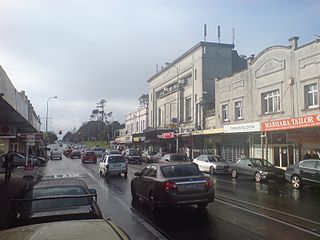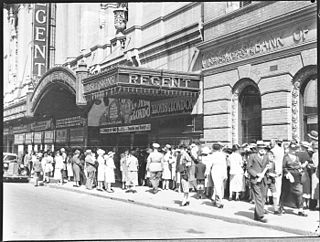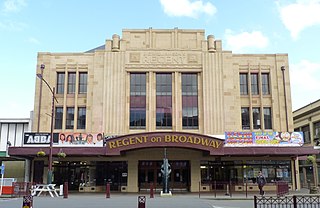
Mount Eden is a suburb in Auckland, New Zealand whose name honours George Eden, 1st Earl of Auckland. It is 4 kilometres (2.5 mi) south of the Central Business District (CBD). Mt Eden Road winds its way around the side of Mount Eden Domain and continues to weave back and forth as it descends into the valley; it runs south from Eden Terrace to Three Kings. Mt Eden village centre is located roughly between Valley Road and Grange Road. The domain is accessible on foot from many of the surrounding streets, and by vehicle from Mt Eden Road. The central focus of the suburb is Maungawhau / Mount Eden, a dormant volcano whose summit is the highest natural point on the Auckland isthmus.
Myra Tania De Groot was a British-born theatre and television actress, and agent. She performed in the United Kingdom, United States, New Zealand and Australia.

Kingsland is an inner-city suburb of Auckland, the largest and most populous urban area in New Zealand. Kingsland is under the local governance of the Auckland Council. It is the home of Eden Park, New Zealand's largest stadium, which hosted the finals for the 2011 Rugby World Cup. Kingsland has a village centre that contains a series of shops, restaurants, pubs and monthly markets.

Balmoral is a suburb of Auckland, New Zealand that is bordered by Mount Eden, Epsom, Mount Roskill and Sandringham and is located approximately 5 km from the centre of Auckland. It was named around the turn of the 20th century and derives its name from Balmoral Castle, the Scottish country residence of the Royal family. Much of the housing in the area is from the 1920s and 1930s, often in the Californian Bungalow style. Balmoral was part of Mount Eden Borough Council which became a part of Auckland City in 1989. In November 2010, the area was included into the Albert-Eden-Roskill ward of the new Auckland Council.

The Regent Theatre was a heritage-listed cinema and entertainment venue in George Street, Sydney, New South Wales, Australia, built in 1928 as a flagship for Hoyts, and was demolished in 1988 by property developer Leon Fink.

Olivia Tennet is a New Zealand actress and dancer best known in her home country for her role as Tuesday Warner on the nightly medical drama Shortland Street, along with several roles in television and theatre. Outside of New Zealand, she is best known for her roles in The Lord of the Rings: The Two Towers (2002), Power Rangers RPM (2009), and the independent film Blood Punch (2013).

An atmospheric theatre is a type of movie palace design which was popular in the late 1920s. Atmospheric theatres were designed and decorated to evoke the feeling of a particular time and place for patrons, through the use of projectors, architectural elements and ornamentation that evoked a sense of being outdoors. This was intended to make the patron a more active participant in the setting.

Komedia is an arts and entertainment company which operates venues in the United Kingdom at Brighton and Bath, and a management and production company Komedia Entertainment. Beyond hosting live comedy, the venues also host music, cabaret, theatre and shows for children, featuring local, national and international performers. The Brighton and Bath venues operate cinemas within their buildings in partnership with Picturehouse. Komedia also creates broadcast comedy and has most notably co-produced and hosted the live recordings of seven series of the Sony Award-winning Count Arthur Strong's Radio Show! for BBC Radio 4 and is a co-producer on BBC1's sitcom Count Arthur Strong.

The Regent on Broadway is a large theatre in Palmerston North, New Zealand, named so because it is the Regent Theatre on Broadway Avenue.

The State Theatre is a 2034 seat heritage listed theatre located at 47–51 Market Street, in the Sydney central business district in the City of Sydney local government area of New South Wales, Australia. The theatre was designed by Henry Eli White with assistance from John Eberson and built between 1926 and 1929. It hosts film screenings, live theatre and musical performances, and since 1974 it has been the home of the annual Sydney Film Festival. It is also known as State Building and Wurlitzer Organ. The property is privately owned. It was added to the New South Wales State Heritage Register on 2 April 1999.

Eden Court Theatre is a large theatre, cinema and arts venue situated in Inverness, Scotland close to the banks of the River Ness. The theatre has recently undergone a complete refurbishment and major extension, adding a second theatre, two dedicated cinema screens, two performance/dance studios, improved dressing room and green room facilities and additional office space. The theatre's restaurant and bar facilities have also been totally overhauled and improved.

Auckland Theatre Company (ATC) is a professional theatre company in Auckland. It was founded in 1992 and since 2016 has been based in ASB Waterfront Theatre in the Wynyard Quarter in central Auckland.

Lopdell House is a category I historic building in Titirangi, Auckland. It was first opened as Hotel Titirangi in 1930. In 1942 it was bought by the Ministry of Education and became a school for the deaf, and then a teacher's residential centre named Lopdell House. The Waitemata City Council purchased it in 1983 and leased it to the Lopdell House Society, who reopened in 1986 as an arts centre. Adjacent to the house is a statue of Titirangi founder, Henry Atkinson.
The Dust Palace is a circus theatre company based in Auckland, New Zealand. It was co-founded by actors Eve Gordon and Mike Edward in 2009.

The Kenneth Myers Centre is a landmark building in Auckland, New Zealand. Originally known as the 1YA Building and then the Television New Zealand building, the building was purchased by the University of Auckland and modified in 2000–01. Located in Shortland Street in the Auckland CBD, the "strikingly original structure" built in 1934 is registered by Heritage New Zealand as a Category I Historic building. The Gus Fisher Gallery is located in the building.

The Playhouse Theatre is a performing arts centre situated in Glen Eden, New Zealand. The building was constructed in 1937 following a fire that destroyed the Glen Eden Town Hall that was on the site at the time. The Theatre has continued to serve West Auckland, initially for civic and community functions and events, moving into cinema and theatre productions by the 1970s when the name of the building officially changed to The Playhouse Theatre. Various theatre groups that had used the venue eventually amalgamated as the Waitakere Playhouse Theatre Trust in 1997. After considerable fundraising, the building was upgraded and in 2003 reopened as a modern performing arts facility.
Raymond Benjamin Thomas Hawthorne is a New Zealand theatre director, and is regarded as one of the country's most senior performing arts practitioners.

Studio West is a motion picture and television production facility in West Auckland, New Zealand. Opening in 1996, the studio became the primary filming location for the United States television series Power Rangers in 2002. The eight acre site, 20 minutes from the Auckland City Centre, features four sound stages, including the largest purpose-build sound-stage in Auckland, which opened in 2022.

Mt Eden Congregational Church, also known as St James Church is a historic former church in Mount Eden, Auckland, New Zealand. Constructed in 1900 to a neo-classical design from Mitchell and Watt for a Congregational church it later renamed to St James Church following the 1969 union of Congregational churches with the Presbyterian Church of New Zealand. In the 21st century the church fell into disrepair and as the church could not fund the repairs the building was sold, later being developed into residential apartments.


















